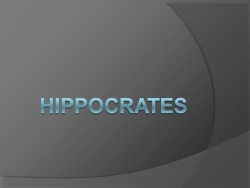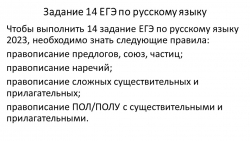Презентация на тему " Hippocrates"

- Рубрика: Презентации / Другие презентации
- Просмотров: 48
Презентация для классов "Презентация на тему " Hippocrates"" онлайн бесплатно на сайте электронных школьных презентаций uchebniki.org.ua
Hippocrates of Cos (Greek: Ἱπποκράτης; Hippokrátēs; c. 460 BC – c. 370 BC) was an ancient Greek physician of the Age of Pericles (Classical Athens), and is considered one of the most outstanding figures in the history of medicine. He is referred to as the father of Western medicine in recognition of his lasting contributions to the field as the founder of the Hippocratic School of Medicine. This intellectual school revolutionized medicine in ancient Greece, establishing it as a discipline distinct from other fields that it had traditionally been associated with (notably theurgy and philosophy), thus establishing medicine as a profession.
However, the achievements of the writers of the Corpus, the practitioners of Hippocratic medicine, and the actions of Hippocrates himself are often commingled; thus very little is known about what Hippocrates actually thought, wrote, and did. Hippocrates is commonly portrayed as the paragon of the ancient physician, credited with coining the Hippocratic Oath, still relevant and in use today. He is also credited with greatly advancing the systematic study of clinical medicine, summing up the medical knowledge of previous schools, and prescribing practices for physicians through the Hippocratic Corpus and other works.
Biography
Historians agree that Hippocrates was born around the year 460 BC on the Greek island of Kos (Cos), and became a famous ambassador for medicine against the strong opposing infrastructure of Greece. For this opposition he endured a twenty-year prison sentence during which he wrote well known medical works such as The Complicated Body, encompassing many of the things we know to be true today. Other biographical information, however, is likely to be untrue (see Legends).
Soranus of Ephesus, a 2nd-century Greek gynecologist,was Hippocrates' first biographer and is the source of most personal information about him. Information about Hippocrates can also be found in the writings of Aristotle, which date from the 4th century BC, in the Suda of the 10th century AD, and in the works of John Tzetzes, which date from the 12th century AD.
Soranus wrote that Hippocrates' father was Heraclides, a physician, and his mother was Praxitela, daughter of Tizane. The two sons of Hippocrates, Thessalus and Draco, and his son-in-law, Polybus, were his students. According to Galen, a later physician, Polybus was Hippocrates' true successor, while Thessalus and Draco each had a son named Hippocrates.
Monument to
Hippocrates in
his native island of Kos
Soranus said that Hippocrates learned medicine from his father and grandfather, and studied other subjects with Democritus and Gorgias. Hippocrates was probably trained at the asklepieion of Kos, and took lessons from the Thracian physician Herodicus of Selymbria. The only contemporaneous mention of Hippocrates is in Plato's dialogue Protagoras, where Plato describes Hippocrates as "Hippocrates of Kos, the Asclepiad."Hippocrates taught and practiced medicine throughout his life, traveling at least as far as Thessaly, Thrace, and the Sea of Marmara. Several different accounts of his death exist. He probably died in Larissa at the age of 83 or 90, though some say he lived to be well over 100.
Direct contributions to medicine
Hippocrates and his followers were first to describe many diseases and medical conditions. He is given credit for the first description of clubbing of the fingers, an important diagnostic sign in chronic suppurative lung disease, lung cancer and cyanotic heart disease. For this reason, clubbed fingers are sometimes referred to as "Hippocratic fingers". Hippocrates was also the first physician to describe Hippocratic face in Prognosis. Shakespeare famously alludes to this description when writing of Falstaff's death in Act II, Scene iii. of Henry V.
Hippocrates began to categorize illnesses as acute, chronic, endemic and epidemic, and use terms such as, "exacerbation, relapse, resolution, crisis, paroxysm, peak, and convalescence."Another of Hippocrates' major contributions may be found in his descriptions of the symptomatology, physical findings, surgical treatment and prognosis of thoracic empyema, i.e. suppuration of the lining of the chest cavity. His teachings remain relevant to present-day students of pulmonary medicine and surgery. Hippocrates was the first documented chest surgeon and his findings are still valid.
The Hippocratic school of medicine described well the ailments of the human rectum and the treatment thereof, despite the school's poor theory of medicine. Hemorrhoids, for instance, though believed to be caused by an excess of bile and phlegm, were treated by Hippocratic physicians in relatively advanced ways. Cautery and excision are described in the Hippocratic Corpus, in addition to the preferred methods: ligating the hemorrhoids and drying them with a hot iron. Other treatments such as applying various salves are suggested as well. Today, "treatment [for hemorrhoids] still includes burning, strangling, and excising." Also, some of the fundamental concepts of proctoscopy outlined in the Corpus are still in use. For example, the uses of the rectal speculum, a common medical device, are discussed in the Hippocratic Corpus. This constitutes the earliest recorded reference to endoscopy.
Hippocratic Oath
The Hippocratic Oath, a seminal document on the ethics of medical practice, was attributed to Hippocrates in
antiquity although new information shows it
may have been written after his death.
This is probably the most famous document
of the Hippocratic Corpus. Recently the authenticity
of the document's author has come under scrutiny.
While the Oath is rarely used in its original form
today, it serves as a foundation for other, similar
oaths and laws that define good medical practice and
morals. Such derivatives are regularly taken today
by medical graduates about to enter medical practice.
«I swear by Apollo, Asclepius, Hygieia, and Panacea, and I take to witness all the gods, all the goddesses, to keep according to my ability and my judgment, the following Oath.
To consider dear to me, as my parents, him who taught me this art; to live in common with him and, if necessary, to share my goods with him; To look upon his children as my own brothers, to teach them this art.
I will prescribe regimens for the good of my patients according to my ability and my judgment and never do harm to anyone.
I will not give a lethal drug to anyone if I am asked, nor will I advise such a plan; and similarly I will not give a woman a pessary to cause an abortion.
But I will preserve the purity of my life and my arts.
I will not cut for stone, even for patients in whom the disease is manifest; I will leave this operation to be performed by practitioners, specialists in this art.
In every house where I come I will enter only for the good of my patients, keeping myself far from all intentional ill-doing and all seduction and especially from the pleasures of love with women or with men, be they free or slaves.
All that may come to my knowledge in the exercise of my profession or in daily commerce with men, which ought not to be spread abroad, I will keep secret and will never reveal.
If I keep this oath faithfully, may I enjoy my life and practice my art, respected by all men and in all times; but if I swerve from it or violate it, may the reverse be my lot.»
« Клянусь Аполлоном, врачом Асклепием, Гигиеей и Панакеей, всеми богами и богинями, беря их в свидетели, исполнять честно, соответственно моим силам и моему разумению, следующую присягу и письменное обязательство: считать научившего меня врачебному искусству наравне с моими родителями, делиться с ним своими достатками и в случае надобности помогать ему в его нуждах; его потомство считать своими братьями, и это искусство, если они захотят его изучать, преподавать им безвозмездно и без всякого договора; наставления, устные уроки и всё остальное в учении сообщать своим сыновьям, сыновьям своего учителя и ученикам, связанным обязательством и клятвой по закону медицинскому, но никому другому.
Я направляю режим больных к их выгоде сообразно с моими силами и моим разумением, воздерживаясь от причинения всякого вреда и несправедливости. Я не дам никому просимого у меня смертельного средства и не покажу пути для подобного замысла; точно так же я не вручу никакой женщине абортивного пессария. Чисто и непорочно буду я проводить свою жизнь и свое искусство. Я ни в коем случае не буду делать сечения у страдающих каменной болезнью, предоставив это людям, занимающимся этим делом. В какой бы дом я ни вошел, я войду туда для пользы больного, будучи далёк от всякого намеренного, неправедного и пагубного, особенно от любовных дел с женщинами и мужчинами, свободными и рабами.
Что бы при лечении — а также и без лечения — я ни увидел или ни услышал касательно жизни людской из того, что не следует когда-либо разглашать, я умолчу о том, считая подобные вещи тайной. Мне, нерушимо выполняющему клятву, да будет дано счастье в жизни и в искусстве и слава у всех людей на вечные времена, преступающему же и дающему ложную клятву да будет обратное этому»
Клятва Гиппократа на древне греческом .
Ὄμνυμι Ἀπόλλωνα ἰητρὸν, καὶ Ἀσκληπιὸν, καὶ Ὑγείαν, καὶ Πανάκειαν, καὶ θεοὺς πάντας τε καὶ πάσας, ἵστορας ποιεύμενος, ἐπιτελέα ποιήσειν κατὰ δύναμιν καὶ κρίσιν ἐμὴν ὅρκον τόνδε καὶ ξυγγραφὴν τήνδε. Ἡγήσασθαι μὲν τὸν διδάξαντά με τὴν τέχνην ταύτην ἴσα γενέτῃσιν ἐμοῖσι, καὶ βίου κοινώσασθαι, καὶ χρεῶν χρηίζοντι μετάδοσιν ποιήσασθαι, καὶ γένος τὸ ἐξ ωὐτέου ἀδελφοῖς ἴσον ἐπικρινέειν ἄῤῥεσι, καὶ διδάξειν τὴν τέχνην ταύτην, ἢν χρηίζωσι μανθάνειν, ἄνευ μισθοῦ καὶ ξυγγραφῆς, παραγγελίης τε καὶ ἀκροήσιος καὶ τῆς λοιπῆς ἁπάσης μαθήσιος μετάδοσιν ποιήσασθαι υἱοῖσί τε ἐμοῖσι, καὶ τοῖσι τοῦ ἐμὲ διδάξαντος, καὶ μαθηταῖσι συγγεγραμμένοισί τε καὶ ὡρκισμένοις νόμῳ ἰητρικῷ, ἄλλῳ δὲ οὐδενί. Διαιτήμασί τε χρήσομαι ἐπ' ὠφελείῃ καμνόντων κατὰ δύναμιν καὶ κρίσιν ἐμὴν, ἐπὶ δηλήσει δὲ καὶ ἀδικίῃ εἴρξειν. Οὐ δώσω δὲ οὐδὲ φάρμακον οὐδενὶ αἰτηθεὶς θανάσιμον, οὐδὲ ὑφηγήσομαι ξυμβουλίην τοιήνδε. Ὁμοίως δὲ οὐδὲ γυναικὶ πεσσὸν φθόριον δώσω. Ἁγνῶς δὲ καὶ ὁσίως διατηρήσω βίον τὸν ἐμὸν καὶ τέχνην τὴν ἐμήν. Οὐ τεμέω δὲ οὐδὲ μὴν λιθιῶντας, ἐκχωρήσω δὲ ἐργάτῃσιν ἀνδράσι πρήξιος τῆσδε. Ἐς οἰκίας δὲ ὁκόσας ἂν ἐσίω, ἐσελεύσομαι ἐπ' ὠφελείῃ καμνόντων, ἐκτὸς ἐὼν πάσης ἀδικίης ἑκουσίης καὶ φθορίης, τῆς τε ἄλλης καὶ ἀφροδισίων ἔργων ἐπί τε γυναικείων σωμάτων καὶ ἀνδρῴων, ἐλευθέρων τε καὶ δούλων. Ἃ δ' ἂν ἐν θεραπείῃ ἢ ἴδω, ἢ ἀκούσω, ἢ καὶ ἄνευ θεραπηίης κατὰ βίον ἀνθρώπων, ἃ μὴ χρή ποτε ἐκλαλέεσθαι ἔξω, σιγήσομαι, ἄῤῥητα ἡγεύμενος εἶναι τὰ τοιαῦτα. Ὅρκον μὲν οὖν μοι τόνδε ἐπιτελέα ποιέοντι, καὶ μὴ ξυγχέοντι, εἴη ἐπαύρασθαι καὶ βίου καὶ τέχνης δοξαζομένῳ παρὰ πᾶσιν ἀνθρώποις ἐς τὸν αἰεὶ χρόνον. παραβαίνοντι δὲ καὶ ἐπιορκοῦντι, τἀναντία τουτέων»

















